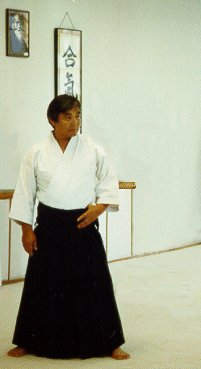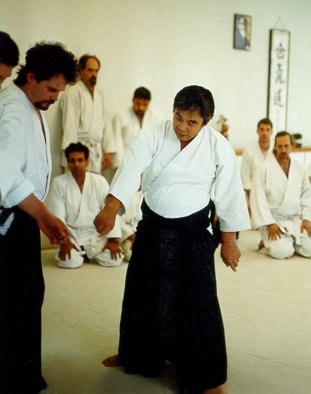
An interview with M. Kanai Shihan
"The early days."
Interviewed by R. Zimmermann
Mitsunari Kanai Shihan, 8th dan, Chief Instructor of New England Aikikai, was one of O-Sensei's last uchi deshi. The following interview took place on June 12, 1999, between classes, at a seminar he taught at Toronto Aikikai. It has been published in the Summer 1999 issue of Aikido East, the Journal of the United States Aikido Federation Eastern Region, and at the New England Aikikai web site.
RZ - Sensei, you have been living in the US for over thirty years. Can you tell us about the early days and about how it was that you went to Boston?

KS - When I was at Hombu, I got a letter from the President of Aikido of Boston, Mr. Ray Dobson, Terry's younger brother. The letter said there were about 60 people practicing Aikido, that they needed an instructor, and that they could offer the airplane fee, an apartment and a salary. I forget how much it was, but it was in the letter. At that time, Doshu Kisshomaru Ueshiba, who we used to call Waka Sensei, had gone to New York and stopped in Boston. There he saw a dojo, which was quite small, but with lots of young people inside. So he decided "OK, we will send an instructor". That's how I went to Boston.
RZ - And did it turn out to be exactly like that?
KS - Not really (laughter) ... when I arrived in Boston there were only 6 or 7 members in the dojo, the apartment they mentioned was just a space on the second floor above a factory, and I couldn't get a salary, because the dojo had no money. Soon after my arrival, the acting Vice President, Fred Newcomb, had taken over from Ray Dobson. I later found out that those 6 or 7 members were the Board of Directors of Aikido of Boston, and that they had voted that they did not have to pay any dues themselves.
RZ - Don't tell me they also voted that you had to pay dues!
KS - No, but I had to feed myself somehow, so I used the money from the return air ticket to buy food. So I was stuck and couldn't go back.
RZ - Did you think maybe there had been a mistake somewhere?
KS - Yes ... maybe a small one. I later found out that when Doshu had visited Boston, Fred had brought 60 of his University friends to the dojo to give the impression that they were practicing (laughter). Anyway, for a long time I had no salary, so Yamada Sensei decided to send me to a nice place: New Jersey! (laughter). So I went there to see about starting a dojo, but already there was somebody teaching. His name was Bill something - I forget - and I decided then that if I was going to start Aikido somewhere, I would prefer to start from nothing. So I stayed in Boston.
RZ - When did things start improving?
KS - Around that time I could not speak much English, so I did not know what was going on. I remember that Yamada Sensei had originally set up my salary to be 50 dollars per week, but even though I taught all week, and every Saturday and Sunday I taught private lessons to a family that came from Connecticut, I still could not earn any income, and I couldn't understand why. Luckily, a Japanese student came who could speak very good English. I thought this was a sign from God so I grabbed him, and the first thing I did was call a meeting of the Board of Directors. That's how I found out what was going on and about what they had voted and what they were doing. Without going into details, I was so mad that I fired the whole Board! After that, people started coming to the dojo and it got better. Also around that time, another good thing happened to me. One woman, who was married to a Judo instructor who did not treat her very nicely, came by and mentioned that Wellesley Co llege offered a course in women's self-defense. She picked up the phone and told them "Don't do Judo, Aikido is better". Then I got a job teaching Aikido at Wellesley College, and that's when I got my first salary.
RZ - When did New England Aikikai start?
KS - I started a dojo in Chinatown in November 1966, in what is called the Combat Zone. Downstairs there was a go-go bar, across the street there was another go-go bar, and there were hippies at every corner, so it seemed like a good place for a dojo (laughter). Everything was so different from what I was used to!
RZ - Do you recall any interesting events from those early days in the Combat Zone?
KS - Often there were burglars who broke into the dojo. I remember one of my students was working as a musician in one of the go-go bars and once he heard some noises upstairs and thought someone was breaking in. So he called me and I went there, and everything was smashed: O-Sensei's scroll, his picture, Doshu's picture, the desk was broken in half ... (sigh)... When the police came they asked what we did there, and after explaining, they said that if I caught whoever did that, I should throw them out the window. I thought "What a great country!" (laughter). So then I started staying overnight at the dojo sometimes.
RZ - Did you ever catch anyone breaking in?
KS - Yeah, I did.
RZ - Sensei, I don't know if that's a fond or a mischievous smile.
KS - It was a young kid, so although I had my sword in my hand, I couldn't do anything. Not even cut off his hair. But I really scared him. After that they never came back.
RZ - Was the neighborhood dangerous?
KS - All kinds of small things would happen all the time ... but that's normal.
RZ - How long were you there?
KS - For about a year. Then we moved to Central Square in Cambridge, where we stayed for quite a long time. When I went to the dojo, the first thing I would do was count how many students there were. They were the same students every day, and I knew everyone's name, and for a long time I still had less than 10 students. Once I counted 11, and I was so happy! I thought, "Finally I have more than 10!" (laughter).
RZ - Were you considering returning to Japan?
KS - My original plan was to return after 3 years, and my dream was to show O-Sensei to the American people. But about 2 years after I came to Boston, O-Sensei passed away, so I couldn't fulfill that dream. Anyway, 3 years passed but the dojo still did not have many students. When I was teaching in Japan, at Hombu and at Nagoya, my experience was that at least [you] need 3 years to [be] able to run a dojo. Nagoya did very well after 3 years, but [in] Boston, after 3 years, nothing was happening.
RZ - When or what was the turning point?

KS - The dojo moved again around 1979 to Porter Square in Cambridge. It was Summer time. Around then I counted the students again. Now there were about 30.
RZ - Did you know all their names?
KS - Only the women's (laughter). Then from 1980 to 1985, we very quickly grew, to about 120, but after that, we never grew again. When we moved it seemed the old students followed and we got new ones. Now the numbers seem to be going down, so maybe we will have to move once more. I remember there was a Taekwondo instructor when we were in Central Square and again when in Porter Square, and the same guy is now in the space under our dojo. I guess I will have to let him know when we move again (laughter).
RZ - When did you decide to start doing Summer Camps?
KS - The first Summer Camp was in 1967, in New Hampshire. I thought it would be good to bring students together for practice. I started teaching it by myself, and then in 1972, I invited Yamada Sensei and Maruyama Suji of Philadelphia - he is independent now. After that, the Summer Camp was always with Yamada Sensei.
RZ - So selling your return ticket to buy food seems to have been the right thing to do.
KS - Yes, but from 1966 through around 1980, I ate enough potatoes to last me all my life (laughter).
RZ - I'm afraid to ask, but do you still like them?
KS - Yes. Now I am addicted to them (more laughter).
RZ - So those were the good years, huh?
KS - Yeah (more laughter). The Japanese and American people come from such different backgrounds and cultures that early on I got culture shock. Thinking back, I had such a very hard time ... I got tricked ... lied to ... I experienced such disappointment in this country. But always, always, someone helped me, or rescued me, or supported me, and these too are the American people I live together with. Now I am very satisfied to live here.
RZ - Can you tell us some more?
KS - Yes, lots - but I'll save it for later.
RZ - Thank you Sensei for sharing some of your memories and experiences with us.